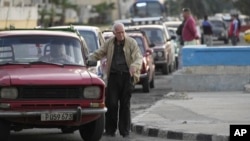“The situation in Cuba right now — economically, socially, with regard to human rights — is an incredibly difficult situation,” said U.S. Assistant Secretary of State for Western Hemisphere Affairs Brian Nichols in a recent interview.
“We’re seeing a number of factors there: unreliable electricity delivery, which results in hours of blackouts; lack of access to fuel for a significant percentage of the population. Or prices that are inaccessible. Significant problems with food insecurity in the country. And continued repression and the incarceration of people who have been peacefully protesting for their basic rights,” he said.
A combination of these factors was tragically on display recently when a Cuban court handed down prison terms of up to 15 years for 13 protesters who were found guilty on charges of sedition and sabotage. They were among hundreds of people who took to the streets of the city of Nuevitas in August 2022, protesting severe power outages.
In July 2021, anti-government demonstrations broke out throughout Cuba. The response of the government was swift and harsh: hundreds were sentenced to long prison terms. Human rights organizations estimate that 1,000 political prisoners remain behind bars in Cuba.
Writing on the social media platform X, Assistant Secretary Nichols called the sentences for the Nuevitas protesters “outrageous.” He added, “The Cuban government’s continued repression of Cubans striving to fulfil their basic rights and needs is unconscionable.”
The United States is exploring and finding ways to help the people of Cuba while limiting benefits to the Cuban regime, said Assistant Secretary Nichols:
“Such as … the transmission of remittances from the United States to Cuba so that families can help each other. I think additional measures to facilitate private sector activity, such as it is in Cuba, is also a positive step that could be important for the future. A significant portion of economic activity in Cuba is already carried out by private entrepreneurs rather than state owned enterprises.”
“A more democratic Cuba would be able to address the challenges that its people face,” declared Assistant Secretary Nichols. And, he said, “[W]e encourage the Cuban government to respond to the demands of its people for a more democratic and inclusive society, through engagement, dialogue, and democratic reform.”






